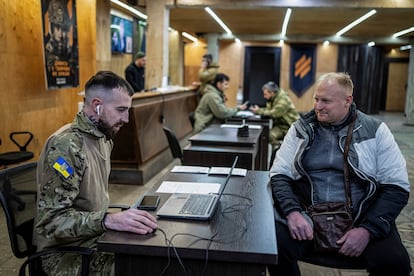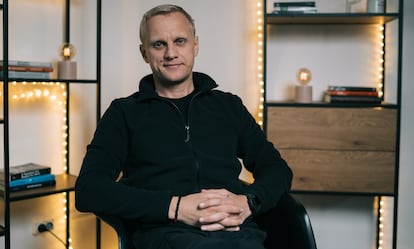Soldiers wanted in Ukraine: Send your resume and we’ll call you
Kyiv is torn between compulsory military service and targeted enlistment while the government, which estimates the number of recruits needed for the front at 500,000, has withdrawn a new mobilization law due to lack of consensus


Before the war in the trenches, there is the war waged in the heads of each potential future soldier. An internal conflict — sometimes heartbreaking — between participating or not in the military defense of Ukraine, besieged by the Russian army for nearly two years. Stepan Kulyna, 29, a native of Chervonohrad in western Ukraine, has already concluded that internal debate and joined the mobilization of new recruits that the Armed Forces of Ukraine need to relieve thousands of exhausted military personnel. “I had many doubts: yes or no, where to go, what to do,” confesses Kulyna in an old bus station converted into a cafeteria in the artistic district of Podil in Kyiv. The decision has been made. He has contacted a couple of brigades and applied through a private employment platform, one of the methods being promoted by the government of Volodymyr Zelenskiy: enlistment according to qualifications instead of compulsory service. An initiative, which, however, is still far from guaranteeing the half a million new recruits the army needs. In the meantime, Moscow is quickly reinforcing in the east.
Ukraine certainly needs new recruits. After Russia’s invasion on February 24, 2022, the government decreed martial law, prohibiting men aged between 18 and 60 from leaving the country — with exceptions, among others, linked to family size, situations of dependency or disability — to ensure their possible mobilization. The volunteer army fed the Ukrainian battalions during the early months of the war so recruitment has been marginal. Those volunteers, however, have been depleting at the same time as frontline forces, while reports of forced conscription in some cities have increased.
Kulyna, with medium-length hair and blue eyes, chooses his words carefully, amid long silences while he seems to shape his thoughts with the movement of his hands. “My decision,” he says, “has been maturing inside me since the beginning of the invasion.” He studied finance and banking, though he now directs commercials and music videos. He wants to be a movie director. Like so many other Ukrainians, Kulyna understands those who tell him that he has to go to the front, that it’s time, but also when others encourage the opposite, because you only live once and the war will always be there.

— Two very different life choices, right?
— Yes, so I asked myself who I want to be: someone with a perfect, fulfilling life, or someone who fights, doesn’t run away, and is responsible for people’s welfare.
— You chose the latter.
— Yes.
Kulyna is managing his mobilization outside the traditional recruitment processes that have supported the war effort. He is in contact with two military units who have vacancies. In addition, he has sent an application with his resume to the human resources company Lobby X, which has had a cooperation agreement with the Ministry of Defense since last November. “They are looking for a position where I can fit in and be more useful,” he says, “it’s a way, as happens in finance, of buying options; I think everyone has the right to decide.” Kulyna, for the moment, has decided not to go to the front lines, if possible. But, he clarifies: “I am not afraid of losing my life.”
That is the debate in Ukraine, exhausted after almost two years of repelling the Russian offensive, suffering shortages of weapons and ammunition and on the defensive at the front: is it the recruits who should decide where to go, voluntarily and according to their profile, or the military commanders who direct the whole process with martial law in hand?
Delays in new mobilization law
Over the past few months, the Ministry of Defense, headed by Rustem Umerov, has worked with the commander-in-chief of the Armed Forces of Ukraine, Valerii Zaluzhnyi, on a new mobilization law. As confirmed by Zelenskiy, the aim of the high command is to recruit between 450,000 and 500,000 people. This would cost, according to estimates from the president’s office, in the region of €12 billion ($13.1 billion). The bill reached the Rada (parliament) last month, but without the consensus of the various factions and under criticism from the Anti-Corruption Committee. The draft, in general terms, brings forward the age of recruitment from 27 to 25; tightens the list of exemptions for health problems; reinforces the restrictions for those who do not register at recruitment centers, and requires the monitoring of men of fighting age who have left the country. The government, in the absence of support, withdrew the text last Thursday for revision.
The delay comes at a delicate moment in the theater of operations, according to the Institute for the Study of War. Russia, with its entire ground force deployed in eastern Ukraine (estimated at 462,000 military personnel), is already carrying out routine rotations of its troops at the operational level.

Vladyslav Greziev, 33, a native of Luhansk in the Moscow-controlled territories, is the founder and CEO of Lobby X. An economist, he joined the military defense of Ukraine the day after Russia invaded. But those were different times. He ended up in a volunteer unit and from there was able to demobilize last summer. That’s when his employment company began to recruit for the army.
“During my experience in the military,” Greziev says, at a cautious volume but accelerated pace, “I saw examples of people who were not where they should have been, although I also remember how a friend used his experience to develop good resource management skills.” Lobby X receives a vacancy for a position from one of the 300 brigades the company works with. They write up the offer, with the position description and the recruiting unit; they then advertise it on their website and the process is opened to candidates. Those interested must send an email with an application and their resume, which will eventually reach the brigade commanders. If it fits, an initial meeting is arranged, perhaps remotely, and then a second one to formalize the hiring.
Greziev, who estimates that he and his team of 20 workers have already received around 57,000 applications for some 1,500 vacancies — infantry positions are the most difficult to fill, while candidates are more interested in positions as transport personnel, drone operators or doctors — pulls out his cell phone and displays a graph showing the evolution of requests for a position in the Armed Forces. “It’s growing,” he notes. Indeed, according to the curve of the data, especially after the agreement with the Ministry of Defense, applications have skyrocketed through this platform, despite allegations of corruption within the army. “It’s not the main reason for someone to demobilize,” says Greziev. “It is the lack of equipment, lack of confidence in a military unit or in the leadership of a commander.”

Corruption in the ranks
Vitali Shabunin, 39, co-founder of the civilian organization Antac (Anticorruption Action Center), knows plenty about corruption. He too threw himself into the defense of the country after February 24, 2022, but, in his case, he never left. He is still part of a unit, stationed in Kyiv, but with time to fight corruption that seems endemic. Things are getting better, though, under Umerov — the previous minister, Oleksii Reznikov, was fired amid a scandal over the purchase of food supplies for the army. “The system is starting to operate properly,” Shabunin notes at Antac headquarters. “After the scandal with Reznikov, it was clear that there had to be a cleanup in Defense,” he continues.
He maintains that it has been in the procurement of equipment for the army using public money that a lot of funds have leaked out, and not so much in bribes to avoid the draft.
— Does the level of corruption in the army discourage potential recruits?
— No, no, the percentage of those who have escaped possible conscription [in a fraudulent way] is very low. Sooner or later, all men will have to serve in the army.
Sign up for our weekly newsletter to get more English-language news coverage from EL PAÍS USA Edition
Tu suscripción se está usando en otro dispositivo
¿Quieres añadir otro usuario a tu suscripción?
Si continúas leyendo en este dispositivo, no se podrá leer en el otro.
FlechaTu suscripción se está usando en otro dispositivo y solo puedes acceder a EL PAÍS desde un dispositivo a la vez.
Si quieres compartir tu cuenta, cambia tu suscripción a la modalidad Premium, así podrás añadir otro usuario. Cada uno accederá con su propia cuenta de email, lo que os permitirá personalizar vuestra experiencia en EL PAÍS.
¿Tienes una suscripción de empresa? Accede aquí para contratar más cuentas.
En el caso de no saber quién está usando tu cuenta, te recomendamos cambiar tu contraseña aquí.
Si decides continuar compartiendo tu cuenta, este mensaje se mostrará en tu dispositivo y en el de la otra persona que está usando tu cuenta de forma indefinida, afectando a tu experiencia de lectura. Puedes consultar aquí los términos y condiciones de la suscripción digital.








































